The use of Applicant Tracking Systems (ATS) by companies is on the rise.
ATS is a software that scans every application that comes in for a job.
Based on the job requirements and profile, it decides whether a recruiter should see a resume or not.
And the odds are not in your favor:
ATS rejects, on average, around 75% of job applications.
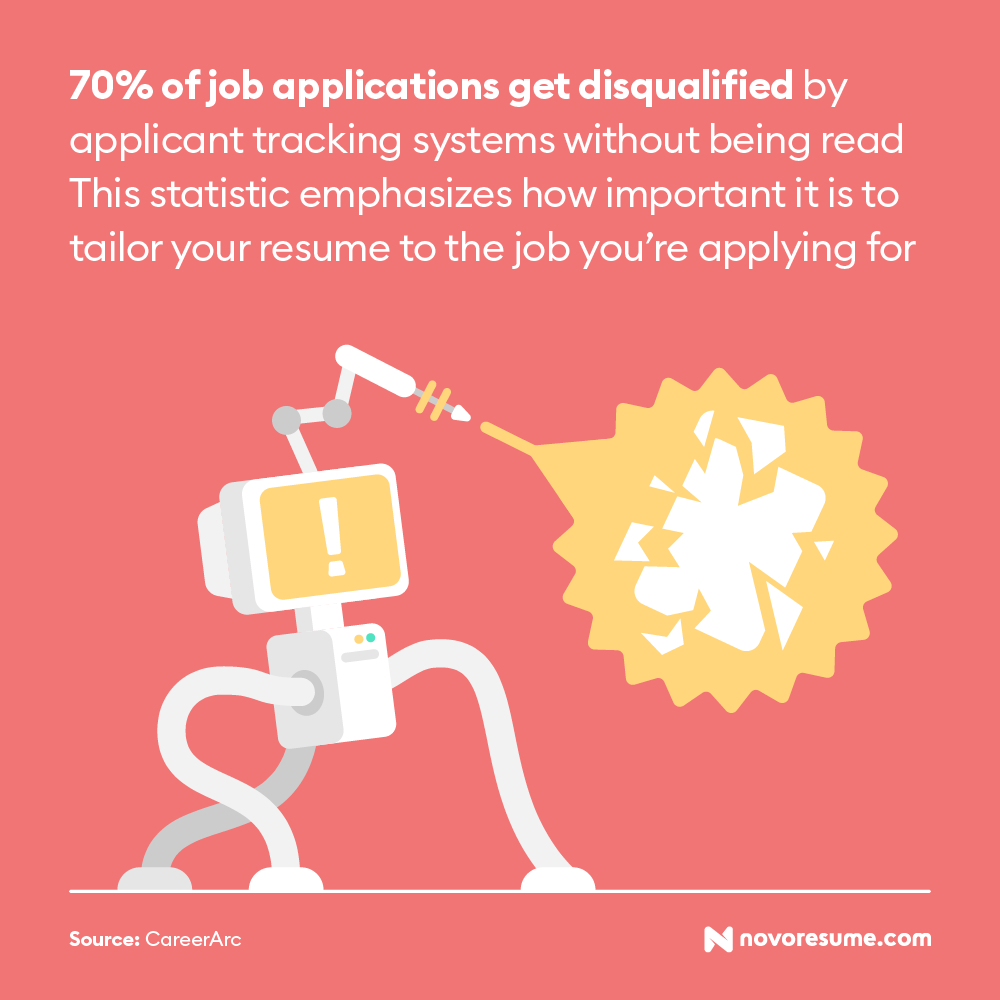
Even if you get past this obstacle, the recruiter will only give your resume a glimpse.
It takes him/her around 6 seconds to decide your entire future.
So how can you get yourself noticed?
Two words:
Resume keywords.
Both ATS as well as the hiring manager scan for relevant keywords that fit what they are looking for.
If you know how to properly use resume keywords, you’ll have a leg up on ATS (and the competition).
- What Are Resume Keywords?
- How to Pick the Right Resume Keywords [Step-by-Step]
- 880+ Keywords Divided by Industry
What are Resume Keywords?
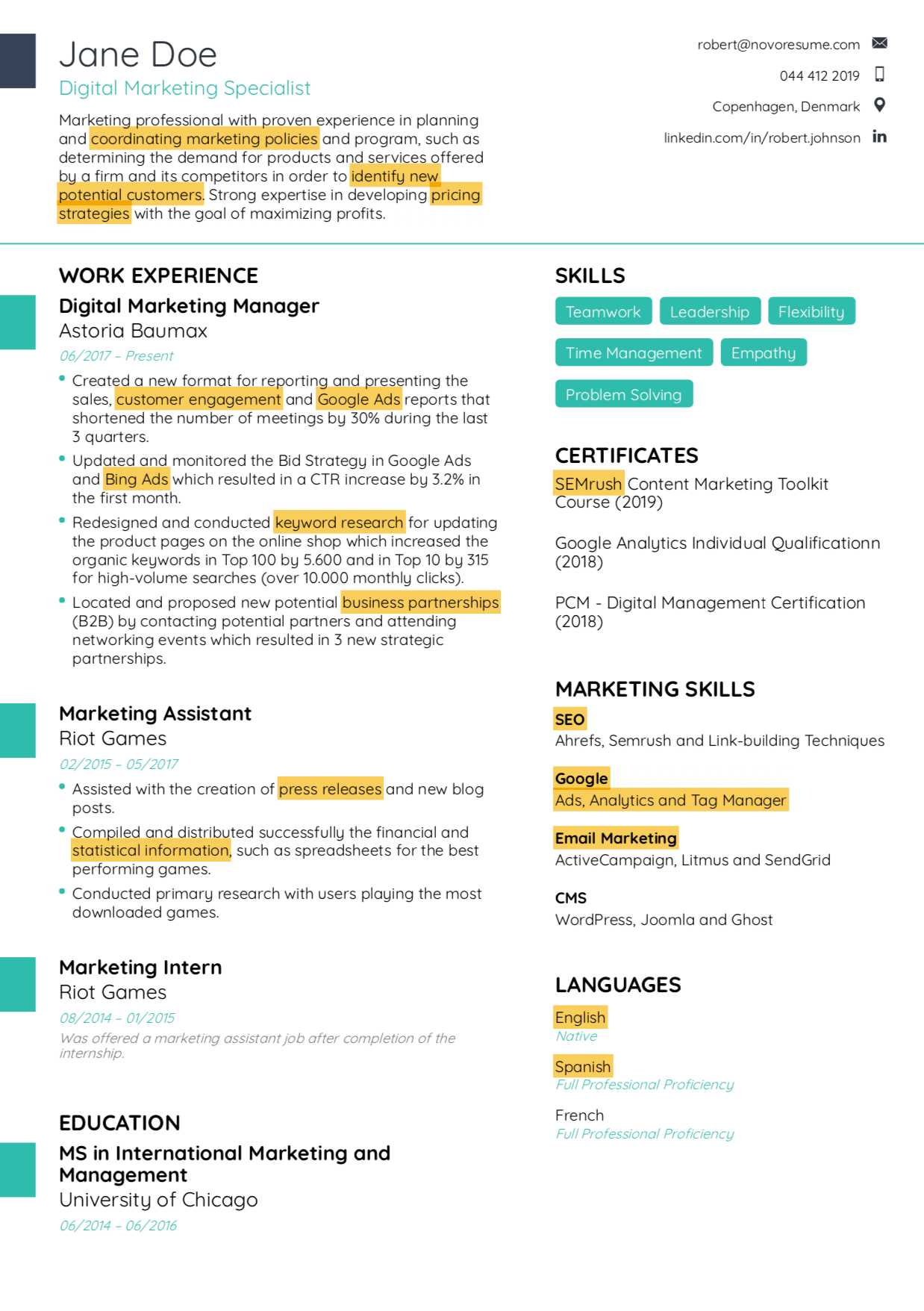
Resume keywords are words or phrases that describe specific job requirements.
They are the abilities, skills, expertise, and values that the recruiter is looking for in a candidate.
Hint: Abilities, skills, and values you should possess.
We know what you’re thinking:
How important can a bunch of words really be?
Well, as we’ve already hammered down, your resume will often be screened by an Applicant Tracking System (ATS).
This system has inbuilt software that filters the different applications that come in.
The recruiter writes a list of keywords in the ATS system. These are the job requirements.
The ATS then scans your applications for those specific keywords that the recruiter plugged in.
If you don’t have the right amount of them, your resume gets thrown in the software void and never reaches the recruiter.
So, what kind of resume keywords should you include?
Well, they vary from job to job.
We’ll get into more details in the next section, but here’s an example so you get the idea:
Let’s say you are an architect applying for a senior position in a large firm.
This is your resume summary:
“A detail-oriented and qualified senior architect who excels in developing construction drawings, creating 3D models, and conducting architectural research and analysis.”
The system reads these keywords in your resume summary:
- Detail-oriented
- Qualified
- Senior Architect
- Construction Drawings
- 3D Models
- Research
- Analysis
The system registers which of these keywords match the ones set as a requirement by the recruiter.
CHECK: senior architect
CHECK: construction drawings
CHECK: 3D models
NOT CHECK: computer-aided design (CAD)
NOT CHECK: 10 years of experience
Now, you might have experience with CAD and also have more than ten years of experience.
But because the ATS didn’t read it, it did not count it, and you might be rejected at this very first stage.
This example perfectly demonstrates the importance of keywords with ATS.
But as we’ve already mentioned, that’s not it. Resume keywords also help impress the recruiter.
How?
Well, imagine you’re looking for a new laptop online and the seller’s website doesn’t provide the critical details you need in the description, like what the resolution, RAM, processor, or graphics are.
You’ll scan the page looking for these keywords. If you don’t find them, you’ll just move on to a different website.
This is the same process that recruiters go through in pursuit of the best person for the job.
Even with all those resumes failing ATS, hiring managers don’t have time to read all passing resumes line by line.
They usually evaluate resumes only by scanning for a predetermined list of keywords.
Think of them as an ATS but in human form:
One that gets tired and bored by looking at the same thing over and over.
You want to stand out from the other pool of applicants and get noticed.
You can do that by picking the right resume keywords.
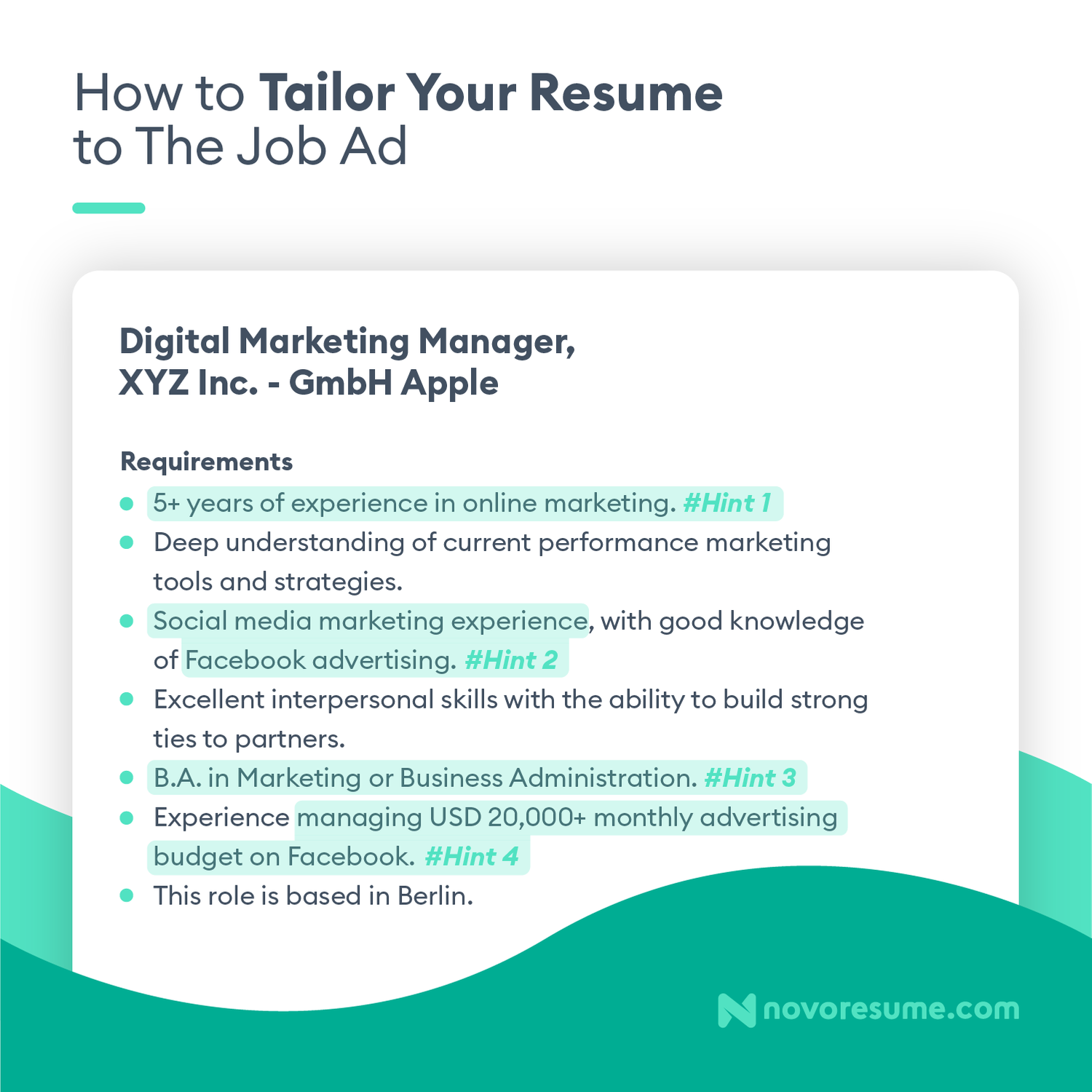
Keep in mind, though, that resume keywords won’t do much unless you’re using an ATS-friendly resume template. After all, if the ATS CAN’T even read your resume, it won’t be able to scan for the keywords!
Novorésumé's resume templates are built with ATS in mind. Just pick one, and you won’t have to worry about formatting!
How to Pick the Right Resume Keywords [Step-by-Step]
So how do you pick the keywords the ATS and the recruiter are looking for?
First, scan the job ad for keywords.
If your resume keywords match the ones given in the job ad, you have a higher chance of getting an interview.
There are two main categories of keywords the recruiters or managers are looking for: (1) job-related skills and (2) action verbs.
Job-related keywords describe your primary skills (both hard and soft) and your core qualifications for this particular job.
e.g: Computer Science, Social Media, Photoshop, Critical-thinking, etc.
Action verbs, on the other hand, demonstrate action: they show what you have accomplished and how you have succeeded in your previous experience.
e.g: managed, developed, planned, maximized, etc.
So, in your resume scan, you should be looking for both job-related keywords and action verbs.
Once you’ve pinpointed all relevant keywords from the job description, it’s time to put them down in your own resume.
But which section do they go under, exactly?
Generally:
- Job-related keywords go under your “Skills”
- Action verbs will help you with your job descriptions in the “Work Experience” section.
- Education requirements will be reflected in your “Education” section,
- Job title descriptions will go on your resume summary.
Are they looking for someone with Photoshop skills?
Great!
“Photoshop” is a job-related keyword and you happen to be a pro at it!
So you would put it down under your “Skills” section.
Easy, right?
We’ll demonstrate how exactly you can pinpoint relevant keywords and use them in your resume with the example below.
Before we get to that, though, two words of caution:
Don’t overdo it.
And don’t lie.
Do not use keywords just for the sake of having them in your resume.
They need to be used in the right context and reflect your actual skills/achievements.
An ATS can’t spot redundancy or a lie, but the recruiter surely can.
So stay honest, relevant, and accurate with your use of resume keywords.
Not sure whether the keywords in your resume are relevant? Here’s how you can be sure:
Pick two to five job advertisements that are similar to the one you are applying for and identify frequently used keywords. Make a list, and include them in your resume (as long as they match your qualifications, of course).
How to Pick the Right Resume Keywords: A Practical Example
So how do all the steps we described look like in practice?
Let’s take a real-life job posting.
Below is a Software Developer job ad.
Step 1: Highlight all the relevant keywords.
We are looking for a software developer with 5+ years of experience to create and execute functional, practical programs. Throughout the job, you will have to collaborate with other programmers and software developers. Your main objective will be to develop powerful, high-quality, user-focused programs and systems.
Job Requirements:
- Bachelor's degree (BSc/BA) in computer engineering, computer science or similar degree.
- Must understand in-depth the implications of software engineering.
- Previous, proven experience on a number of projects for software development.
- Experience with software designing in a test-driven environment.
- Deep knowledge of the frameworks/systems(AngularJS, Git) and coding language (e.g: C++, Javascript).
- The willingness to work in a constantly changing world. Ability to adapt to new technologies and software languages.
- Creativity is a bonus.
- Great communication and teamwork skills.
- Attentive to detail.
Job Responsibilities:
- Work with programmers to build algorithms and flowcharts.
- Produce clean, usable, datatype-based software.
- Incorporate software components and programs from third parties.
- Validate and implement programs and systems.
- Fix, debug and improve existing software.
- Collect and analyze feedback from the client.
- Suggest and enact improvements.
- Create technical paperwork for reference and reporting purposes.
Step 2. As you’re highlighting, divide the relevant keywords into job-related and action verbs.
This will make it super easy for you to write the resume.
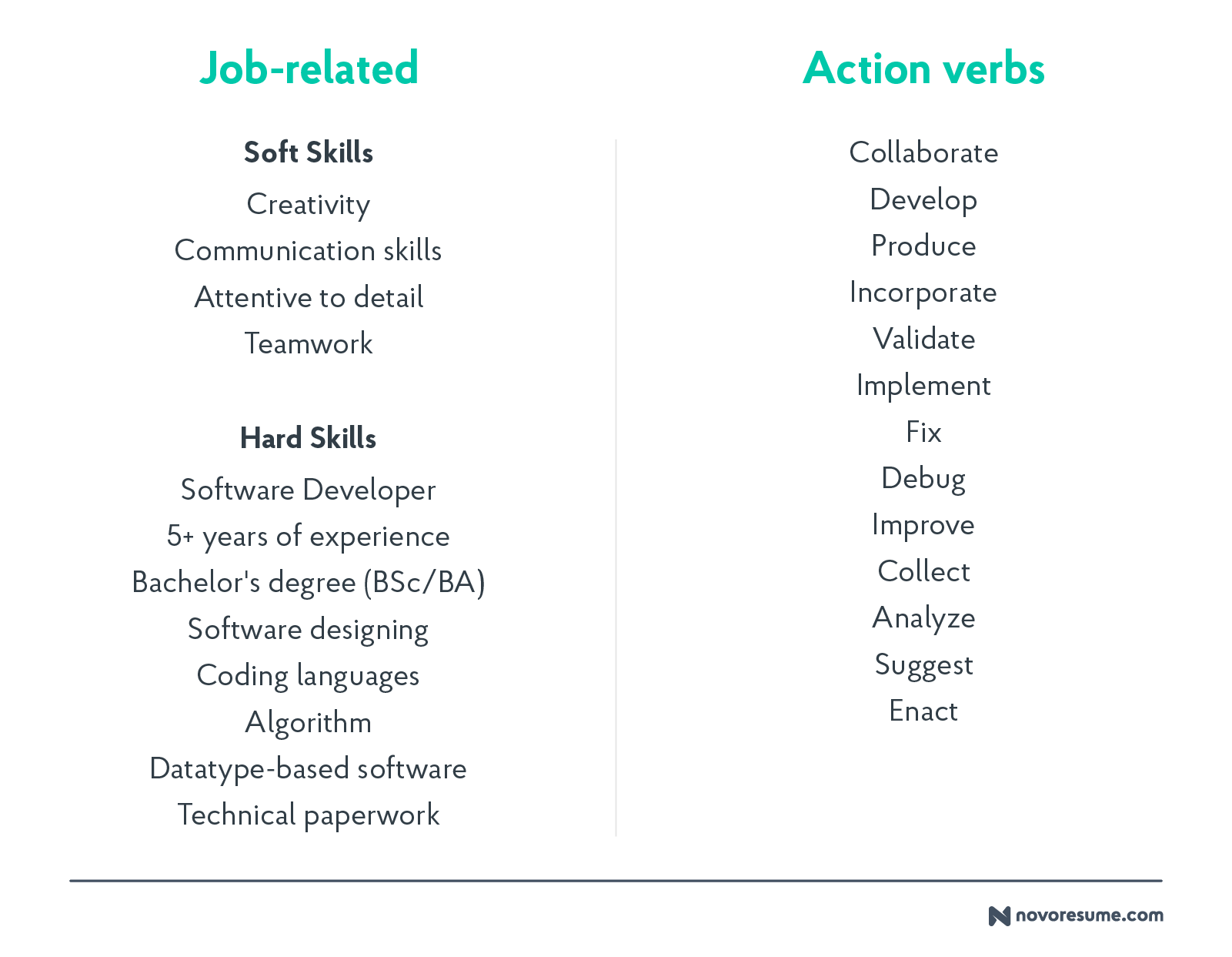
Step 3: Now, we’ll make another division.
This is based on the resume sections which each keyword should fall under.
RESUME SUMMARY:
- Software Developer
- Software designing
- 5+ years of experience
- Develop
- User-focused
WORK EXPERIENCE:
- Develop
- High-quality
- Produce
- Incorporate
- Validate
- Implement
- Fix
- Debug
- Improve
- Collect
- Analyze
- Suggest
- Enact
- Adapt
- Software designing
- Test-driven environment
- Algorithm
- Flowcharts
- Clean
- Usable
- Datatype-based software
- Technical paperwork
- Reporting
SKILLS
- Creativity
- Communication skills
- Attentive to detail
- Teamwork
- Frameworks
- AngularJS, Git
- Coding language
- C++
EDUCATION
- Bachelor's degree (BSc/BA)
- Computer Engineering
- Computer Science
Step 4: What’s left is to reflect upon strengths and choose the best keywords for you.
Keep in mind not all keywords should be included in the resume: only the qualifications and achievements which are relevant to your experience.
Once you’ve decided all the resume keywords relevant to you, use them in your resume.
Step 5: Finally, let’s put everything together.
Take a look at Melissa’s Software Developer ATS tailored resume.
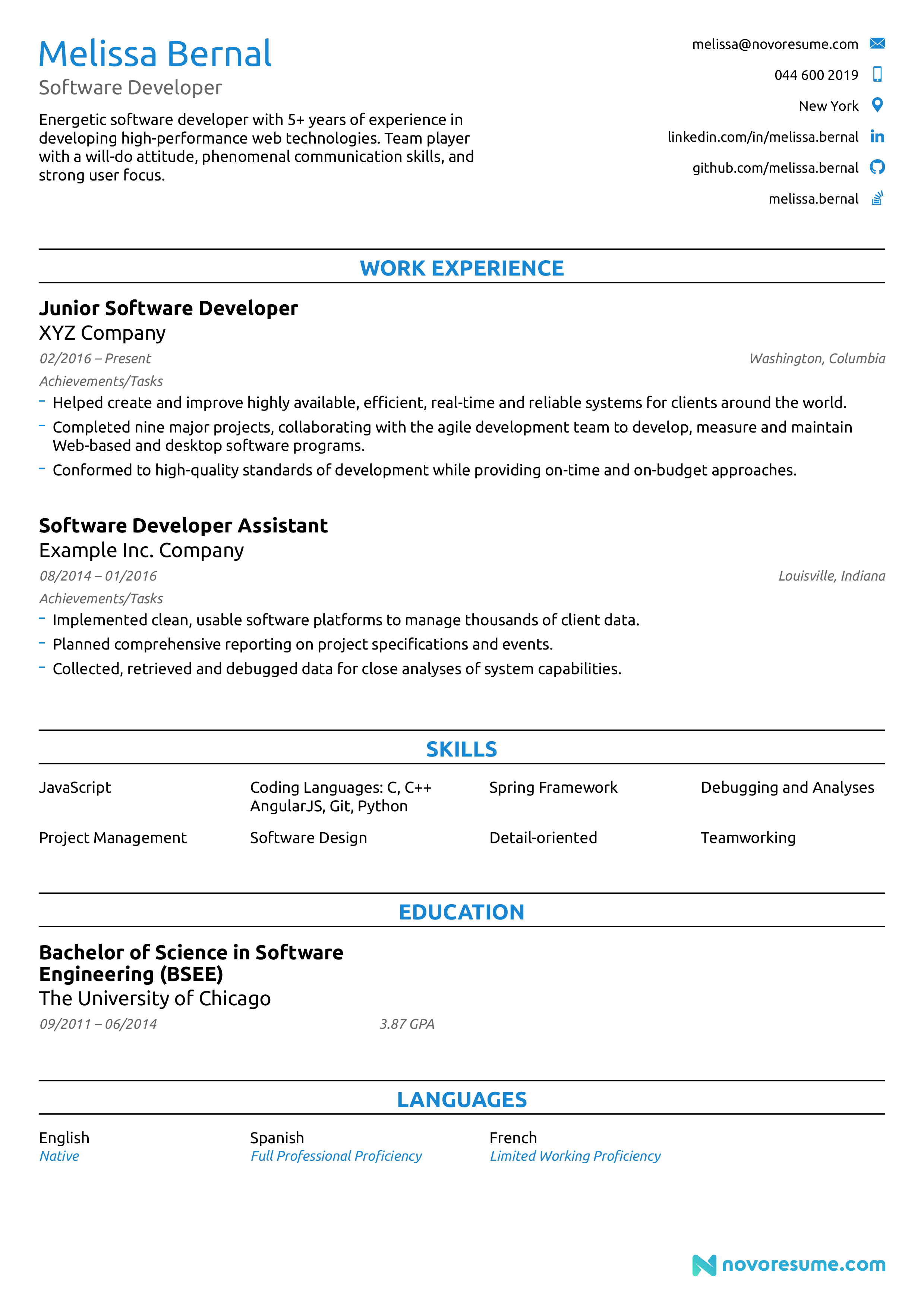
Melissa went through all the described steps in this example and integrated all relevant keywords into her resume.
Melissa just upped her shot at getting that interview.
Now it’s your turn!
In the next section, we’ll show you the most relevant resume keywords for your profession.
880+ Resume Keywords Divided by Industry
Although resume keywords are tailored to the job description, there are some valuable skills recruiters are always keeping an eye on.
Below, you will find a tailored list of top keywords for every profession and industry.
Discover the industry-specific keywords that HR managers, recruiters and the ATS look!
- 53+ Education and Training Resume Keywords [A-Z]
- 119+ Information Technology Resume Keywords [A-Z]
- 45+ Law Enforcement Resume Keywords [A-Z]
- 59+ Tourism and Hospitality Resume Keywords [A-Z]
- 115+ Marketing and Business Administration Resume Keywords [A-Z]
- 143+ Finance and Accounting Resume Keywords [A-Z]
- 57+ Human Resources Resume Keywords [A-Z]
- 32+ Architecture and Construction Resume Keywords [A-Z]
- 54+ Health Care Resume Keywords [A-Z]
- 109+ Manufacturing Resume Keywords [A-Z]
- 91+ Social Work Resume Keywords [A-Z]
53+ Education and Training Resume Keywords [A-Z]
- Administration
- Addressed
- Advised
- Assisted
- Awarded
- Classroom
- Co-directed
- Coach
- Cognitive Skills
- Collaboration
- Community Building
- Computer-based Training
- Counsel
- Course
- Coursework
- Curriculum
- Discipline,
- Education
- Enrollment
- Field Instruction
- Fundraising
- Goals
- Holistic Learning
- Inclusive
- Individualized Education
- Instruction
- Integration
- Interactive
- Interpersonal
- Job Placement
- Listening
- Literacy
- Mentor
- Multi-class
- Networking
- Parent Communications
- Parent-teacher Meeting
- Peer Counseling
- Program Development
- Public Relations
- Recruitment
- Relationship Building
- Scholastic
- Setting Boundaries
- Student
- Teaching
- Technology
- Training
- Tutoring
- Verbal Communication
- Writing Lesson Plans
- Writing Reports
- Written Communication
119+ Information Technology Resume Keywords [A-Z]
- Access platform
- Ad creative/impression/inventory/rotation analysis/configuration/deployment/design
- Application Technology
- Architecture
- Artificial Intelligence
- Banner advertisement
- BSS/ OSS
- Business Analysis
- Business Continuity
- Business support systems (BSS)
- Business Transformation
- C++ Programming
- Capital Budgets
- Certificate authority
- Change Management
- Channel behavior / conflicts/marketing/outcomes/profitability/promotion/satisfaction
- Cloud Computing
- Co-branding
- Competitive intelligence
- Compliance and Security
- Component development
- Customization and Configuration
- Data Centre Operations
- Data Controller
- Data Gathering
- Data Localization
- Data mining/warehousing
- Database Administration
- Database Design
- Database Development
- Database Integration
- Database Management
- Delivery Systems
- Design Patterns
- Digital Marketing (pull/push)
- Digital Media
- Disaster Recovery
- Distributed Systems
- Distribution channels
- E-commerce
- Electronic data interchange (EDI)
- Electronic marketing
- Encryption
- End-User Support
- Enterprise Systems
- E-portal
- Fault Analysis
- Framework
- Geographic Information System (GIS)
- Global HITS
- Graphic design
- Information Security
- Information Technology
- Infrastructure Development
- Intellectual Property Rights (IPR)
- Java Technology
- Knowledge management
- LAN/WAN
- Licensing
- Machine Learning
- Management Information System (MIS)
- MS SQL
- Multiplatform Integration
- Needs Assessment
- Network Administration
- Network Engineering
- Network solutions
- NoSQL
- Open Source Technology
- Operations support systems (OSS)
- Oracle
- Privacy Policy
- Process Reengineering
- Product Launch
- Product Lifecycle Development
- Product Testing
- Professional Service
- Program Management
- Programming / Coding
- Project Management
- Quality Assurance / Code Testing
- Research & Development
- Resource Management
- Root Cause Analysis
- SAS/SPSS
- Scalability and Product Extensions
- SCRUM
- SDLC
- Search Engine Optimization (SEO)
- Service-Oriented Architecture
- Software Configuration
- Software Development
- Software Engineering
- Software Installation / Upgrade
- Software-as-as-Service
- Solutions Delivery
- SQL
- Structured Query Language (SQL)
- System Integration
- Systems Administration
- Systems Configuration
- Systems Deployment
- Systems Development Life Cycle (SDLC)
- Technical Documentation
- Technical Support
- Technology Stack
- Testing
- Turnkey
- UML
- UNIX
- User Interface Design
- Vendor Management
- Visual Basic
- Voice over Internet Protocol (VoIP)
- Vortals (Vertical Industry Portals)
- Web Administration
- Web-Based Technology
- Workflow Management
- Yield Management
45+ Law Enforcement Resume Keywords [A-Z]
- Acquisition
- Adjudication
- Administrative law
- Affidavit
- Antitrust
- Briefs
- Case law
- Clerk
- Community engagement
- Compliance
- Copyright law
- Crime analysis
- Crime prevention
- Crisis management
- Depositions
- Discovery
- Due diligence
- Europol
- Intellectual property
- Interrogation
- Joint venture
- Judicial affairs
- Juridical doctor
- Landmark decision
- Legal advocacy
- Legal research
- Legislative review
- Licensing
- Limited partnership
- Litigation
- Mediation
- Memorandum
- Motion
- Negotiation
- Paralegal
- Patent law
- Police surveillance
- Probate law
- Settlement
- SWAT,
- Trial law
- Unfair compensation
- Uniform patrol
- Will preparation
- Witness protection
59 + Tourism and Hospitality Resume Keywords [A-Z]
- Adherence To Policies And Procedures
- Attention To Detail
- Back Office Operations
- Banquet Operations
- Budgeting
- Catering
- Central Reservation System (CRS)
- Client Needs Assessment
- Club Management
- Competitive Analysis
- Concierge
- Customer Service
- Event Coordination
- Facility Management
- Flexibility
- Food And Beverage
- Food Sanitation
- Front Desk Operations
- Greeting
- Guest Relations
- Guest Retention
- Guest Services
- HACCP
- Health & Safety
- Hospitality Management
- Housekeeping
- Human Resources
- Inventory Planning
- Kitchen Operations
- Maintenance
- Marketing
- Meeting Planning
- Menu Planning
- Multi-Unit Operations
- Multitasking
- New Product Development
- Occupancy
- Portion Control
- Positivity
- Pricing
- Procurement
- Program Management
- Promote Services
- Promotions
- Property Development
- Property Management
- Quality Assurance
- Recall Customer Programs
- Regulatory Compliance
- Reservations
- Resolving Complaints
- Resort Management
- Revenue Projections
- Server
- Service Management
- Training & Development
- Transportation
- Travel and Tourism
- Vendor Management
115+ Marketing and Business Administration Resume Keywords [A-Z]
- Account Management
- Acquisitions
- Administrative Support
- Adobe Creative Suite
- Advertising
- Agile
- Alliances
- Analytical
- Analyzing Data
- API (Application Programming Interface)
- Automation
- Benchmark
- BI (Business Intelligence)
- Branding
- Brand Associations
- Brand Awareness
- Brand Salience
- Budget Management
- Build Relationships
- Business Analysis
- Business Continuity
- Business Development
- Business Intelligence
- Business Plans
- Business Process
- Business Strategy
- Business Systems
- Case Management
- Change Management
- Client Relationships
- Client Services
- CMS (Content Management System)
- Coding
- Commissioning
- Complex Projects
- Consulting
- Content
- Continuous Improvement
- Contract Management
- Conversion
- Cooperation
- Correspondence
- Counseling
- CPG (Consumer Packaged Goods)
- CRM (Customer Relationship Management)
- Cross-Functional Team
- Customer Experience
- Customer Service
- Daily Operations
- Data Analysis
- Data Collection/Entry
- Data Management
- Data Quality
- Digital Marketing
- E-Commerce
- Employee Engagement
- ERP (Enterprise Resource Planning)
- ETL (Extract, Transform, Load)
- FLEX
- HRIS (Human Resources Information System)
- HTML
- IBM (International Business Machines)
- Information Systems
- Internal Communications
- Inventory Management
- KPI (Key Performance Indicators)
- Machine Learning
- Management Consulting
- Market Research
- Negotiation
- Networking
- Operating System
- Operational Excellence
- Performance Management
- Portfolio Management
- Process Development
- Process Improvement
- Product Management
- Product Marketing
- Product Quality
- Project Delivery
- Project Management
- Public Relations
- Quality Assurance/Control/Management
- R (Programming Language)
- Recruit
- Regulatory Compliance
- Relationship Building/Management
- Reporting
- Resource Management
- Retention
- Sales Management
- SAP (System Application Products)
- Scrum
- SDL (Software Development Lifecycle)
- Service Management
- Service Blueprint
- Six Sigma
- Spreadsheets
- SQL Server
- Stakeholder Management
- Standard Operating Procedures
- Standardization
- Start-Up
- Statistical Analysis
- Status Report
- Strategic Direction
- Strategic Planning
- Strong Analytical Skills
- STP Analysis (Segmentation, Targeting, Positioning)
- Supply Chain Management
- SWOT Analysis
- Value Proposition
- Vendor Management
- Workflow Management
143+ Finance and Accounting Resume Keywords
- (FASB) Financial Accounting Standards Board
- Accounting
- Accounts Payable
- Accounts Receivable
- Adjusting/closing entries
- Analysis/analyzing
- Annual Budget
- Annual Reports
- Asset Management
- Audit/auditing/audit controls
- Automatic Data Processing (ADP)
- Balance sheet
- Benefits administration
- Billing
- Bond(s)
- Budget/budgeting/budget control
- Business plan
- Buyout
- CAD (Cash Against Documents)
- Campaign
- Capital budget
- Cashflow
- Cashflow Statement (CFS)
- Cash management
- CFA (Chartered Financial Analyst)
- Chart of accounts
- Client/client base
- Collections
- Commercial lending
- Compliance
- Consumer lending
- Contract management
- Corporate governance
- Corporate treasury
- Cost accounting
- Cost-benefit analysis
- Cost-Effective
- Cost of goods sold (COGS)
- Cost reduction and avoidance
- Credit management
- Data Analysis
- Data Collection/Entry
- Data Management
- Data Quality
- Debt management
- Debt refinancing
- Debt service
- Debt to worth
- Depreciation/accelerated depreciation
- Disbursements
- Discount cash flow
- Dividend(s)
- Due diligence
- EBIT/EBITDA
- Efficiencies
- Equity
- Equity underwriting
- Expenditures
- Expense analysis
- FAFSA
- Fast-paced
- Feasibility
- Financial Analysis
- Financial Management
- Financial Modeling
- Financial Planning
- Financial Reporting
- Financial Statements
- Fixed assets
- Fixed cost
- Forecast/forecasting
- Foreign exchange
- GAAP
- General accounting
- General Ledger
- High stress
- Income Statement
- Inflow/outflow
- Initial Public Offering (IPO)
- Interest rate(s)
- Internal controls
- International Financial Reporting Standards
- Inventory control
- Inventory management
- Investment analysis/management
- Investor relations
- Invoicing
- Job (order) costing
- Journal/journaling
- Lending
- Letter of credit
- Liabilities/liability
- Liquidity
- Loan administration
- Machine Learning
- Management reporting
- Markets
- Mergers and acquisitions
- Mutual fund(s)
- Net present value (NPV)
- Net worth
- Operating reports
- Overhead
- Payroll administration
- Portfolio Analysis
- Process improvement
- Profit and loss analysis
- Profit and loss statement (P&L)
- Projections
- Public speaking
- Purchase accounting
- Quarterly/year-end reporting
- Real estate
- Receipts
- Reconciliations
- Regulations
- Relationship management
- Reporting and analysis
- Revenue Growth
- Reverse takeover
- Risk Management
- ROE/ROI/ROA
- Sarbanes Oxley
- Securities
- Shareholders
- Spreadsheets
- Standards
- Statistical models
- Stock(s)
- Strategic Planning
- Strategic Thinking
- Tax accounting
- Taxation Compliance
- Technology
- Transaction
- Treasury
- Trend analysis
- Underwriting
- Valuation
- Variance analysis
- Vendor
- Venture capital
- Yield
57+ Human Resources Resume Keywords [A-Z]
- American Disabilities Act (ADA)
- Benefits Administration
- Career Pathing
- Change Management
- Claims Administration
- College Recruitment
- Compensation
- Competency-Based Performance
- Corporate Culture Change
- Cross-Cultural Communications
- Diversity Management
- Equal Employment Opportunity (EEO)
- Employee Communications
- Employee Empowerment
- Employee Involvement Teams
- Employee Relations
- Employee Retention
- Employee Surveys
- Expatriate Employment
- Grievance Proceedings
- Human Resources (HR)
- Human Resources Generalist Affairs
- Human Resources Partnerships
- Incentive Planning
- International Employment
- Job Task Analysis
- Labor Arbitration
- Labor Contract Negotiations
- Labor Relations
- Leadership Assessment
- Leadership Development
- Management, Training & Development
- Manpower Planning
- Merit Promotion
- Multimedia Training
- Multinational Workforce
- Organizational Design
- Organizational Development
- Organizational Needs Assessment
- Participative Management
- Performance Appraisal
- Performance Incentives
- Performance Reengineering
- Position Classification
- Professional Recruitment
- Regulatory Affairs
- Retention
- Safety Training
- Self-Directed Work Teams
- Staffing
- Succession Planning
- Train-the-Trainer
- Training & Development
- Union Negotiations
- Union Relations
- Wage & Salary Administration
- Workforce Reengineering
32+ Architecture and Construction Resume Keywords [A-Z]
- Abstraction
- Architectural Codes
- Architectural Rendering
- AutoCAD
- Bilingual
- Building Codes
- Building Construction
- Building Systems
- Computer Processing
- Computer-Aided Design (CAD)
- Conceptualization
- Construction Administration
- Construction Documents
- Creative Thinking
- CSS
- Design Concepts
- Design Development
- Design to Delivery
- Fire Safety
- HTML
- Imagination
- Industrial Design
- Leadership in Energy & Environmental Design (LEED)
- Managing Expectations
- Model Making
- Residential Construction
- Retail Construction
- Sustainable Design
- Technical Vision
- User interface design
- Visual design
- Zoning Codes
54+ Health Care Resume Keywords [A-Z]
- A-V Graft
- Average response time
- Beta-test
- Cardiac Catheterization
- Cardiac Cathlab
- Case history reports
- Caseload management
- Central Line Placements
- Composite Health Care System
- CPR
- Diagnosis
- Electrophoresis
- Emergency treatment
- ER
- Fistula Revascularizations
- Flow sheets
- Government requirements
- HMO
- Hospital procedure
- ICU
- Immunizations
- Instructions
- Instrument trays
- L&D Trays
- Medical assistance
- Nursing practitioners
- Nursing staff
- Occupational therapy
- OR Nurse
- Outpatient
- Pacemaker
- Paternity tests
- Patient care procedures
- Patient comfort
- PCR
- Physician prescriptions
- PICC Lines
- Plastic surgery
- Policies
- Prescription drug
- Presentations
- Quality of care
- Samples
- Satisfaction surveys
- Sedation
- Skin grafts
- Special Procedures Unit
- Surgical equipment
- Swan-Ganz Catheter
- Tests
- Traumatized patients
- Treatment
- Ultrasound
- Water safety
109+ Manufacturing Resume Keywords [A-Z]
- Accident Prevention
- Assembly
- Asset Management
- Audit Control Procedures
- Automated Manufacturing
- Capacity Planning
- Capital Budget
- Capital Machinery Acquisition
- Capital Project
- Cell Manufacturing
- CNC / PLC Machining
- Computer Integrated
- Concurrent Engineering
- Continuous Improvement
- Cost Avoidance
- Cost Reductions
- Cross-Functional Teams
- Cycle Time Reduction
- Distribution Management
- Efficiency Improvement
- Environmental Health & Safety
- Equipment Management
- Ergonomically Efficient
- Facilities Consolidation
- Facility Management
- Forecasting / Budgeting
- Inventory Control
- Inventory Management
- Inventory Planning
- ISO 9000 Compliance
- Just-In-Time (JIT)
- Labor Efficiency
- Labor Relations
- Lean / Agile Manufacturing
- Logistics
- Logistics Management
- Machine Downtime
- Manufacturing (CIM)
- Manufacturing Engineering
- Manufacturing Integration
- Manufacturing Technology
- Master Schedule
- Materials Management
- Materials Planning
- Materials Replenishment
- Multi-Site Operations
- Occupational Health & Safety (OH&S)
- On-Time Delivery
- Operating Budget
- Operations Management
- Operations Reengineering
- Operations Start-Up
- Optimization
- Order Fulfillment
- Order Processing
- Outsourcing
- Participative Management
- Performance Improvement
- Physical Inventory
- Pilot Manufacturing
- Plant Management
- Plant Operations
- Preventative Maintenance
- Process Automation
- Process Improvement
- Process Redesign/Reengineering
- Procurement
- Product Development & Engineering
- Product Rationalization
- Product Testing / Validation
- Production Forecasting
- Production Lead Time
- Production Management
- Production Methodologies
- Production Output
- Production Plans/Schedules
- Production Scheduling
- Productivity Improvement
- Profit & Loss (P&L) Management
- Project Budget
- Prototype Design
- Purchasing / Procurement
- Purchasing Management
- Quality Assurance
- Quality Circles
- Regulatory Compliance
- Re-Tooling
- Safety Documentation
- Safety Management
- Safety Training
- Shipping & Receiving Operation
- Six Sigma
- Spares & Repairs Management
- Statistical Process Control (SPC)
- System (MRP)
- Technology Integration
- Time & Motion Studies
- Total Quality Management (TQM)
- Traffic Management
- Turnaround Management
- Union Negotiations
- Value-Added Processes
- Vendor Management
- Warehouse Management
- Work in Progress (WIP)
- Workflow Optimization
- Workforce Management
- World Class Manufacturing (WCM)
- Yield Improvement
Key Takeaways
Here are some things to keep in mind after reading this article:
- Resume keywords are crucial in a resume. They help you get past ATS and noticed by the recruiter.
- Remember how to make the best use of resume keywords: Scan the job listing for the main responsibilities and requirements the recruiter is looking for. Divide them into job-related responsibilities and action words. Then use them in your own resume in the appropriate sections.
- Don’t overuse resume keywords or lie about your abilities. The recruiter will spot a fraud from miles away.
- Your resume keywords will mainly depend on the specific position you are applying for. However, there are certain in-demand industry keywords the recruiters are keeping an eye on. Revisit our comprehensive list of industry-specific keywords whenever you need some inspiration.
Suggested Reading:



91+ Social Work Resume Keywords [A-Z]
But wait...
There’s more!
Check out our full list of action words and power adjectives for your resume, complete with 340+ action verbs for all professions.